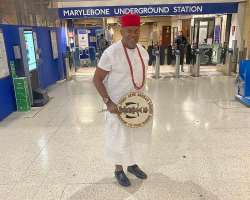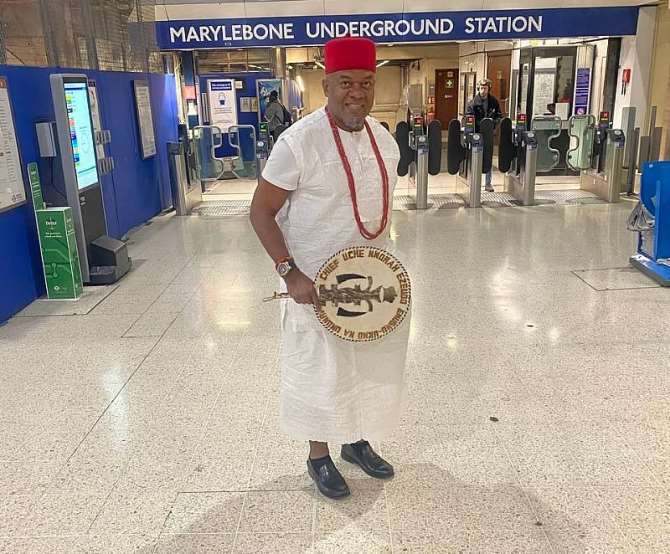Commending Nworah’s Promotion Of Igbo Culture In The UK

“As a titled Igbo man, I believe that through such engagements, we shall introduce different aspects of Igbo culture to existing and new audiences”. When Chief Dr. Uche Nworah said the foregoing ahead of his travel to the United Kingdom where he on Thursday, 12th May, 2022, delivered a lecture at the prestigious Oxford University, United Kingdom, not few of his admirers and followers, including this writer, were sanguine that he will kill his presentation titled, “The Significance of Titles In Igboland” to the admiration of his audiences.
The reason for the strong confidence which his followers reposed in him cannot be farfetched as Ezeudo, as he is fondly called, is unarguably a cultural aficionado of Igbo Culture, and it is by virtue of his cultural disposition and reputation that he was invited to the session, which was facilitated by The James Currey Society, Faculty of Medieval and Modern Languages of the University, as part of the James Currey Society’s Igbo Language Class.
As gathered, Nworah was introduced by Dr. Onyeka Nwelue, an academic visitor and founder of the James Currey Society, at the African Studies Centre, University of Oxford.
Ostensibly assuring his confidants that the topic would be well presented to his audiences in the UK, Norah said, “This is the planned opening slide of my Oxford University presentation tomorrow, Thursday, 12th May, 2022, on the Significance of Titles in Igboland.
“I decided to use this picture I took with Chief Chike Chekeluba (Onwa Awka-Etiti) years ago, the day he took his Onwa title.
“Although we look like “Ndi Dibia na agba afa” in the picture, the picture and the surrounding story however captures the essence of title taking in Igboland.
I will start with an introduction and overview of titles and title taking in Igboland. Delve into categories of Igbo titles and how titles can be acquired in Igboland.
Chief Dr. Uche Nworah
“I will then attempt an exposition of the significance of titles in Igboland, and the challenges associated with title taking”.
There is no denying the fact that Nworah’s efforts toward the promotion of Ndigbo culture to the western world, as demonstrated in his recent visit to UK is constructive and futuristic towards giving fresh impetus to the relationship between Diasporic Igbo community in the UK and nationals of their host country. His presentation unarguably is didactic enough to shed light on some areas of African culture, particularly from the context of Igbo culture, that are not understood or misunderstood given the fact that relationship between Ndigbo in the UK and their host country should not be limited to economic and political issues, rather, culture and cultural exchanges should also become a key part of it.
In fact, it cannot be pooh-poohed that Nworah’s presentation in the UK has added a fresh impetus to the relationship between the Europeans and Africans, particularly Ndigbo being part and parcel of the continent. It is more beneficial when analyzed from the fact that it has deepened the culture and cultural exchange between both nations.
The foregoing view is not in any way misplaced as culture is so present in our lives that it often becomes invisible. Whether in the form of music, dance, cinema, television, plastic arts, literature, theatre or gastronomy, culture feeds our imaginations and punctuates our daily lives.
It is also at the heart of our identity. By forging a common aesthetic, common references and narratives, together living culture and our cultural heritage, material and immaterial, define our place in, and our relationship with, the world.
Culture is, in short, an important economic resource. Design, cinema and the creative industries are all sectors that generate employment and income. Archaeological heritage and museums attract tourism, which in turn encourages growth in other areas of activity, such as local production of artisan souvenirs, the hospitality industry and the tour guide sector...
Gladly, Nworah was intellectual enough at his presentation in the UK to explain that traditional titles, which is one of the major aspect of Igbo culture and tradition, are an important aspect of Igbo socio-economic and cultural life.
In his presentation, he told his audiences that traditional titles could be inherited, bestowed/given or taken by any Igbo man or woman who feels that he/she has come of age, wealthy and he/she is willing to go through the required rituals.
He said certain titles such as Chieftaincy titles, could be bestowed on a person either in his community or from another community because of what he or she has done or achieved for them. He explained that traditional Igbo titles can be acquired through inheritance, selection and nomination by friends and associates in a distant town as a friend of the community (Nwannedinamba).
According to him, integrity and contributions towards community development are some of the benchmarks in determining candidates who would be given the titles, rather than monetary inducement as being deceptively guessed in some quarters.
Dr. Nworah said that title taking protocols vary from one Igbo community to another, and that some titles however, are exclusive to certain families based on ancestral lineage.
“In typical Igbo communities, and during social interactions, people are not known, called or greeted by their given names but rather by their titles. Titles are a deep reflection and an extension of another aspect of Igbo culture such as speaking in parables or communicating with proverbs”, he added
He listed the most prominent titles outside Igweship to include; Onowu- the traditional prime Minister and second-in-command to the Igwe, Chieftancy title-the most common. There are categories as some are of cabinet rank and some are not. Ozonkpu title- peculiar to people from Enugwu-Ukwu community in Anambra state only. A man cannot take Ozonkpu title, if his father is still alive. Ojiana title-custodians of community land. Iyom title- the highest and most prestigious title for women in Igbo land.
Nworah said Ozo and Nze titles are traditional Igbo Societies, and anybody who meets the membership requirements can join and the criteria varies from town to town.
“In Enugwu-Ukwu, my town for instance, it is very expensive, you will spend over 10 million Naira throughout the process, and later reap afterwards as you are then highly regarded, and will start benefiting from new members joining the society”, he added.
Nworah, who is also the holder of titles in 3 major Igbo communities (Ezeudo Enugwu-Ukwu na Umunri, Udoka Awka and Ezeudo Abagana), revealed that anyone can bear any name or title in Igboland. However, for such names and titles to gain legitimacy, the bearer must do the needful “nsacha” of the title, (meaning spiritual purification), and go through the necessary traditional protocols, including holding a feast before such privilege will be bestowed on him/her.
Concluding, he charged Igbos in diaspora and Ndigbo at home to collectively work towards preserving Igbo culture.
He said, “The efforts of The James Currey Society at Oxford University, and Dr. Onyeka Nwelue should be applauded and emulated by others. Ndigbo all over the world should be proud of their rich identity and cultural heritage. Bear Igbo names, eat Igbo food, wear Igbo clothes, celebrate Igbo festivals, take titles, associate with and marry one another. This is how we will ensure race survival. Custodians of Igbo culture should help to make Igbo titles more attractive to the younger generation through reducing initiation and membership costs, and dispelling stories and rumours of fetish practices during such initiations”, Dr. Nworah.
Against the foregoing milieu, there is no denying the fact that Nworah’s promotion of Igbo Culture in the UK is commendable.

